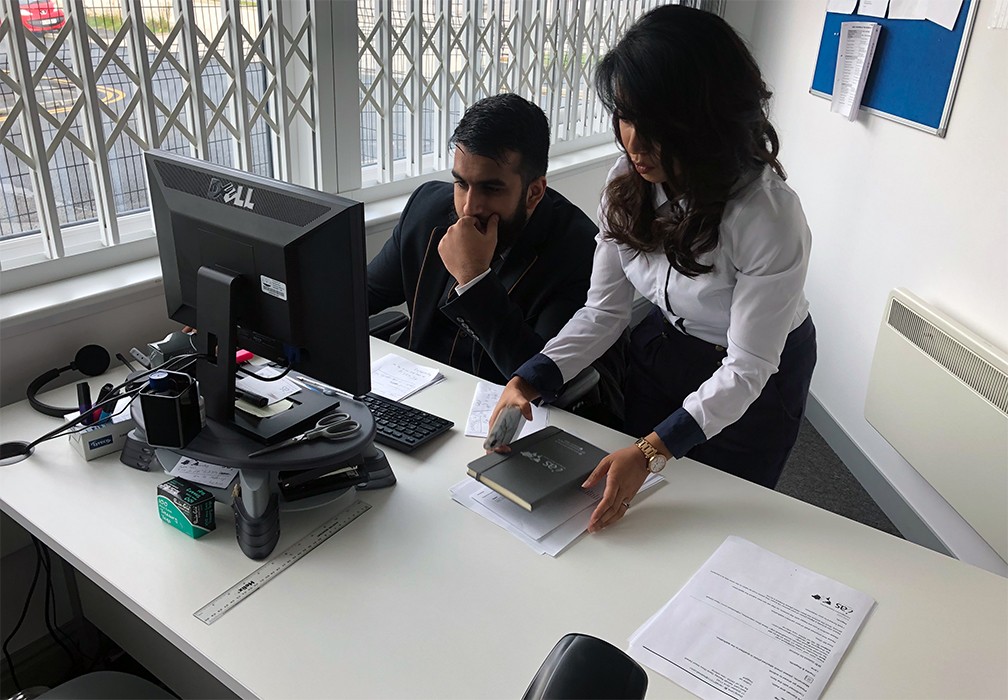Where Do You Pay Taxes if You Work Remotely?
Working from home may offer more flexible freedom, like having control of your time. However, individuals who work from home must consider their taxes and pay them when due. Tax payment procedures can be quite strenuous, and that’s why we’re here to help you.
For more information about handling payroll and tax payments if you do remote work, call us at 0330 311 6351 for immediate help & assistance with your situation. We’re here to help you in person, via the phone, or online.
Page Contents
- Why Do Remote Workers Pay Taxes?
- Do You Pay Tax As A Remote Worker When You Move To Another Country?
- Is It Possible For A Remote Worker To Experience Double Taxation?
- What Are The Dangers Involved If A Remote Worker Evades Taxes?
- How You Can Pay Less Tax As A Remote Worker?
- Do You Have To Pay Taxes As A Remote Worker If You Work In Another Country?
- How Total Law Can Help?
Why Do Remote Workers Pay Taxes?
Paying taxes is vital to working remotely. Firstly, if you are working abroad as a remote worker, all taxes are meant to be paid into your state of residence, irrespective of the type of worker you’re. It’s mandatory as a remote worker to file taxes in your residence country. It’s known as the usual abode or principal residence. In the process of tax payment, remote workers go through a lot of procedures, and they might even pay extra fees such as local tax if they are located in countries like Canada, Germany, Belgium, etc.
Furthermore, it’s important to note that if you’re working from a different country as a remote worker for at least 6 months, you’re required to make some preparations and most likely get a visa. It might be a short-term or work visa. Some countries like Portugal allow people working remotely to apply for a remote worker visa and also get their residence and work permit which allows them to extend their stay for a year.
Lastly, you can also apply for a special income tax regime known as Non-Habitual Resident (NHR) status, which has some benefits as you pay your tax over time
Do You Pay Tax As A Remote Worker When You Move To Another Country?
The answer is yes. As stated earlier, if you work remotely and you want to make the best out of your work experience, it’s important to follow the rules and regulations of wherever you work.
The local tax rules, tax rates, and processes are peculiar to each country, and it depends on how long you stay in the country. Some countries have laws concerning how long a foreigner can live in their country before they start paying taxes. Furthermore, the best thing to do before working remotely in any company in any country is to conduct adequate research about tax policies.
Is It Possible For A Remote Worker To Experience Double Taxation?
Double taxation happens when a remote worker lives in one country but earns his/her income from another country and pays taxes to both countries due to domestic tax laws. For illustration, Jane resides in Canada but works as a remote worker for a company in the United States of America. Double taxation is when she pays tax in Canada and also pays tax in America.
Examples of countries that enforce double taxation are Belgium, Canada, the Czech Republic, the United Kingdom, South Africa, Spain, France, Italy, Singapore, etc. Also, double taxation can occur when a company imports goods from another country. It’s known as import tax or import duty.
However, some of the countries that enforce double taxation have been working towards creating a long-lasting solution to the issue. Countries like the UK have established treaties that help to avoid double taxation. Numerous efforts are being made to protect people working remotely from being taxed twice.
What Are The Dangers Involved If A Remote Worker Evades Taxes?
As a remote worker, when you do not abide by the rules and regulations binding the tax payment in the state or country your organisation is located in, it can cause more harm than you think. Below are some of the things that can happen:
- You’ll Pay Fines And Late Fees
If you owe taxes, don’t pay tax at all, or pay late, depending on the country your company is located in, you’ll have to pay a penalty interest fine or late fee which might be quite high. So, the best thing to do is to avoid that by paying your remote worker tax as early as possible.
- You Can Get A Criminal Record
Those who don’t comply with tax laws in any country might face some criminal charges or even serve a jail term. Tax evasion is termed fraud in some countries, and it’s not handled with levity. It’s better to pay taxes, so you don’t tarnish your image.
- It Can Lead To Double Taxation
If you don’t abide by the rules, this can happen. This is common to remote workers who don’t make their tax-residency status and income known. If they don’t live where they work, they might have to pay taxes in their resident country and where they work.
- You Can Be Banned From The Country
Those who don’t abide by the local tax laws of any country can get banned until they pay what they owe and promise to pay taxes when due.
In essence, remote work taxes are very important to pay if you work remotely. Complying with the rules will save you a lot of money and improve your workflow. Even if the procedures seem hard to follow, we’re here to help you.
How You Can Pay Less Tax As A Remote Worker?
If you want to work remotely and pay less tax, here are a few ways you can do:
- Know Your Employment Status
Whenever you want to work with anyone or any organisation remotely, it’s imperative not to assume the nature of the work if it’s not clarified in writing. In the UK, for example, some laws bind the employment of remote employees, and these are the things you should read as a remote worker or potential remote worker.
Ask your employer how you’re classified and if there are any issues about your classifications, they should be resolved by your employer immediately. The earlier this is done, the better.
- Get Familiar With Local Tax Laws
As previously stated, it’s important to get yourself familiar with laws binding tax payments in the country you work in, as different countries, states, and regions have numerous laws on tax payments.
The bodies handling the calculation and collection of taxes in each country also differ. In the UK, HMRC is responsible for the collection and calculation of taxes. Most employees find it easier to work with a professional that has tax records. This is because it will save them a lot of money and stress.
- You Can Ask Your Employer To Hire You Through An EOR (Employer Of Records) Or PEO (Professional Employer Organisation)
When you’re hired through an EOR or PEO, it’s a more effective way of employment, and it makes your work easier without too much burden of taxes. On the company’s part, hiring an employee through this method is a very effective method because it saves a lot of money, especially for a Start-Up.
Do You Have To Pay Taxes As A Remote Worker If You Work In Another Country?
The answer is yes. Different countries have different rules guiding how long you can stay in their country before you can be a tax resident. Most times, you have to apply as a tax resident and pay income tax if you stay more than 6 months consecutively in a year.
As much as tax-residency rules apply to remote workers, it also applies to contractors and part-time workers, especially when it comes to reporting taxes. For instance, in the UK or EU countries, the HMRC ensures that proper records are kept when you pay your tax, and this will aid your workflow and reduce problems for you and your employer.
To prevent tax violations, if you stay in one country and you come to work in another, you’ll be asked to submit some documents and ensure that you declare your income to the bodies involved. These are part of the procedures involved. That’s why it’s advisable to outsource tax payments and every process involved to external bodies. You can hire a local accountant to help you with everything, and this will make the whole process a lot easier for you.
How Total Law Can Help?
Summarily, taxes are a crucial part of your job if you are working abroad. Working remotely can be fun, and the freedom that comes with it is incomparable, but if you want to have a great working experience, it’s expedient to comply with the rules and regulations of your resident country and the country you’re working in.
As stated earlier, the easiest way to pay taxes is to hire a local accountant or speak to one of our immigration lawyers who can walk you through the process.
If you need help concerning your tax payment and the procedures involved, you can call us at 0330 311 6351 for immediate help & assistance with your situation. We’re here to help you in person, via the phone, or online.
Advice Package
Comprehensive immigration advice tailored to your circumstances and goals.
Application Package
Designed to make your visa application as smooth and stress-free as possible.
Fast Track Package
Premium application service that ensures your visa application is submitted to meet your deadline.
Appeal Package
Ensure you have the greatest chance of a successful appeal. We will represent you in any case.

The Advice Package
During this untimed Advice Session with our professional immigration lawyers in London, you will receive our comprehensive advice, completely tailored to your needs and your situation.

The Application Package
With our Application Package, your dedicated immigration lawyer will advise you on your application process and eligibility. Your caseworker will then complete and submit your forms to the Home Office on your behalf.

The Fast Track Package
Our Fast-Track Application Package is a premium service for those who need to submit their application in time with their deadlines. Your case will become a top priority for our lawyers and you will benefit from our highest-quality services.

The Appeal Package
By choosing our Appeal Package, you can rely on our lawyers’ legal knowledge and experience to ensure you have the highest chance of a successful appeal. We will also fully represent you in any hearings/tribunals.




